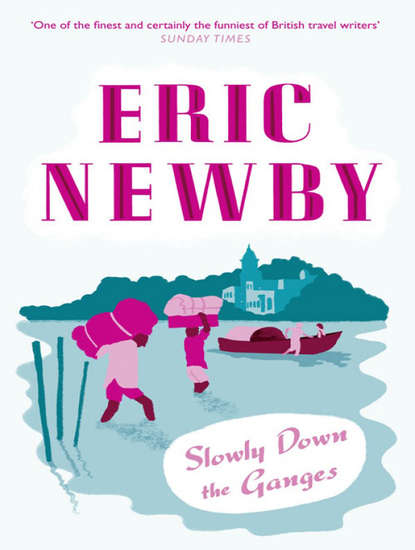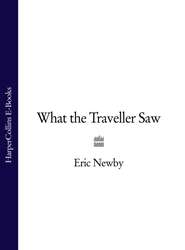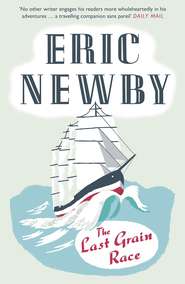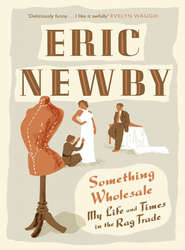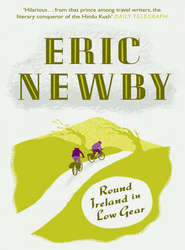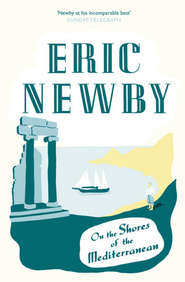По всем вопросам обращайтесь на: info@litportal.ru
(©) 2003-2024.
✖
Slowly Down the Ganges
Автор
Год написания книги
2018
Настройки чтения
Размер шрифта
Высота строк
Поля
from A Pilgrim’s Travel Guide
At six-fifteen the following morning we were at the bridge, ready to embark. A bitter wind was blowing and against a pink sky flights of teal and mallard were rocketing upstream towards the Hardwar gorge.
The boat was moored ready for us alongside one of the piers of the bridge on the upstream side and the current was grinding it against the stones, emphasising its tinniness. It was as full of holes as it had ever been and there were eight inches of water in the bottom. Because of its lightness it had somehow achieved a balance between floating and foundering; but if any further weight was imposed on it, it would certainly scuttle itself.
Of the crew whom we had interviewed the previous day, a pair of terrible ruffians with mops of greasy hair, there was no sign. We had told them to be ready to leave at six and we had arrived at a quarter past, hoping to start within an hour or so, this being the custom of the country, but now it was evident it did not matter at what time they arrived; there would be no sailing in this boat today or any other day.
We were prey to all the violent, unworthy emotions that have consumed visitors to India from time immemorial: impotent rage; the desire that Timur Leng, the terrible Tatar, knew and was able to gratify, to make hecatombs and raise great towers of skulls (he made a sanguinary detour to the banks of the Ganges in the Year of the Hare, 1399, and entered Hardwar and sacked it sometime at the end of January that year); but for us there was no such way to vent our spleen, except by allowing it to evaporate. For the inhabitants of India have a simple genius for concocting exasperating situations which, however long he may have lived in the country and however much he may have anticipated them, burst on the victim each time with pristine force. One of the prerequisites of real exasperation is that there should be no one to vent one’s anger on, and there was no one. The wind whistled through the reed walls of the bridge-builder’s hut but there were no dormant figures inside it to rouse from sleep and galvanise into activity. We were alone on the river bank under a vast sky.
It was at this moment that G. announced that the Executive Engineer of the Irrigation Works, who had been away on our first morning in Hardwar, had come back.
‘He has returned from Tour,’ he said. ‘Now he is giving us his boat. But first we are speaking with Assistant Engineer. He is feeling kindly towards us.’
The Assistant Engineer lived in a bungalow that was almost completely shrouded in bougainvillaea. It was difficult to imagine why he should be feeling well-disposed towards us. After an interval he appeared in a dressing-gown. The patience of Indian officials in the face of requests that must appear to them to be either lunatic or frivolous has to be experienced to be credible. What we were doing in this instance was the equivalent in Britain of waking a fairly senior officer of the Metropolitan Water Board at a quarter to seven on a winter’s morning, in order to ask him to wake a yet more senior official and request the loan of a boat from one of the reservoirs in order to go down to Southend.
‘I think Executive Engineer is lending you one boat,’ he said, when we explained the situation to him and he called the Executive Engineer on his telephone. The conversation was very brief.
‘He is not lending you his boat,’ he said.
‘We must now visit Executive Engineer,’ G. said.
‘But he’s just said he isn’t going to lend it.’
‘Yes, yes,’ said the Assistant Engineer. ‘Now you must visit him. He is lending you his boat.’
The Executive Engineer, who was in even greater déshabillé than his assistant, lived in a vast building close by the headworks of the canal.
‘I have no boat,’ he said without preamble.
‘You have two boats.’
‘I am needing two boats. I have no boat that I can spare.’
We showed him a letter from the Prime Minister. In Delhi it had had all the magic of a pre-war British passport. ‘We, Edward Frederick Lindley, Viscount Halifax, Baron Irwin, Knight of the Most Noble Order of the Garter, a Member of His Majesty’s Most Honourable Privy Council, Knight Grand Commander of the Most Exalted Order of the Star of India, Knight Grand Commander of the Most Eminent Order of the Indian Empire etc., etc., etc., His Majesty’s Principal Secretary of State for Foreign Affairs, Request and require …’ Here, in the sticks, the impact was visibly diminished.
‘You must go to Delhi,’ he said, brightening momentarily. ‘The Prime Minister is in Delhi.’
‘We have just come from Delhi. He is in good health. We spent some time with him.’ This last tossed in carelessly.
‘Then you must go to Roorkee. At Roorkee there is Army Bridging Unit. They have many boats. It is only thirty miles.’
For what seemed ages the fruitless conversation butted backwards and forwards.
Finally, Wanda had a brilliant idea. She has developed a great capacity for overcoming disaster. Not that she has ever been without it.
‘You have two boats,’ she said. ‘It is obvious from what you say that you must be having two boats’ (effortlessly she slipped into the vernacular). ‘There is a boat in the river by the bridge which although unsuitable for a long journey is excellent for your canal. Lend us your boat and if you need two boats during the next two days use that one.’
Only in India could such an illogical argument have had any chance of acceptance. The boat that Wanda was offering the Executive Engineer was not even hers to offer. I tried to picture the scene in which the Executive Engineer tried to borrow the Contractor’s boat, and having succeeded, watched it sink in the canal. But suddenly he capitulated. Perhaps because he was even more alarmed by G.’s suggestion that he should close down the Upper Ganges Canal and divert its waters into the river, thereby allowing us to rush headlong downstream in a boat of really large draught.
The boat had most probably been built in the time of the British. Perhaps the prototype had been designed in a moment of nostalgia by an engineer who was an exiled rowing man. It was a five-oared skiff fitted with swivel rowlocks. It resembled what used to be known as a ran-dan, only in a ran-dan bow and stroke have oars and two uses sculls, and this was even larger. A few rare examples of ran-dan are or were employed until recently at the two Universities for conveying dons about their occasions and they are still used on the Thames by swan-uppers; but instead of being built of varnished mahogany this boat was constructed from mild steel plate put together with rivets. It was twenty-five feet long, had a five-foot beam and to show its official status it was painted battleship grey. Loaded it drew eighteen inches; and it needed thirty-two men to lift it.
We set off down the Ganges at two o’clock in the afternoon. It was 6th December, my forty-fourth birthday. Our immediate destination was the Balawali Bridge, twenty-five miles as the crow flies from Hardwar, a journey which we believed would take two days. The boat was deep-loaded, so deeply and with such a quantity of gear that only three of the five oarsmen’s benches could be occupied. Besides the six occupants (we had recruited two more boatmen and the Irrigation Engineer had sent one of his own men to ensure that his boat was not misused) there was the now augmented luggage, plus further purchases we had made in the bazaar at Hardwar; sacks of chilli powder and vegetables; namdars – blankets made from a sort of coarse felt; teapots, kettles, hurricane lamps and reed mats. I had even bought an immense bamboo pole from a specialist shop in the bazaar as a defence against dacoits (robbers) whose supposed whereabouts were indicated on some rather depressing maps which G. had annotated with this and similar information, in the same way as mediaeval cartographers had inscribed ‘Here be dragons’ on the blank expanses of their productions. G. himself had made an even more eccentric purchase from the same establishment – two officer’s swagger-canes about a foot and a half long which now, as he stood in the middle of the boat directing its final trimming with them, made him look like an old-fashioned sailor semaphoring. Our bills were paid. We had left a hundred rupees for a lorry-man to come to collect the boat downstream. Prudently we had put this into the hands of the men from Shell who by this time, together with the one who had told me that I had liked roses, were the only people we trusted. We had paid the thirty-two men who had come tottering barefooted across a mile of hot shingle with the boat upside over their heads all the way from the canal to the Ganges; we had shaken hands with everybody – some, whom we had never seen before, had wept; and for the second time in two days we had advanced money to boatmen for them to buy provisions for the journey (we never saw the first two boatmen again). We were ready to go.
As we crouched low in the boat while the current took us under the bridge, an old bridge-builder who was wearing spectacles as large as the headlamps of a Rolls Royce, dropped sacred sweets on us as a provision for the journey. His tears wetted our heads. The boatmen put their oars in the rowlocks and rowed off smartly. We were off.
Two hundred yards below the bridge and some twelve hundred miles from the Bay of Bengal the boat grounded in sixteen inches of water. This was no shoal. There was no question of being in the wrong channel. At this point the uniform depth of the river was sixteen inches. I looked upstream to the bridge but all those who had been waving and weeping had studiously turned their backs. The boatmen uttered despairing cries for assistance but the men at the bridge bent to their tasks with unwonted diligence. As far as they were concerned we had passed out of their lives. We might never have existed.
We all got out, including Wanda, who was wearing an ingenious Muslim outfit which consisted of peg-top trousers of white lawn and a hieratical-looking shift. She simply took off her trousers and joined us, still apparently fully dressed, in the water.
The bottom of the river was full of rocks the size of twenty-four-pound cannon balls which were covered with a thin slime of green weed. The water was absolutely clear. It frothed and bubbled about our calves. Fifty yards below the place where we had gone aground, the shallows terminated in a waterfall down which the river cascaded. We began to dig a passage towards it with our hands, lifting the great slimy stones and plonking them down on either side of the boat. Under them were more stones of equal size and even greater slipperiness.
It is difficult to describe the emotions that one feels when one is aground on a twelve-hundred-mile boat journey within hailing distance of one’s point of departure. It is an experience that has fallen to the lot of some blue-water sailors who have grounded when setting off to sail round the world. But about them there was something of tragedy which derived from the grandeur of the design. To be stranded in a river sixteen inches deep is simply ludicrous.
At the head of the fall to which we finally succeeded in dragging the boat, it became stuck with its forepart hanging over the drop. It would go neither backwards nor forwards, but suddenly as we redoubled our efforts it overbalanced and began to go downhill at a tremendous rate with everyone sprawling over the gunwales, vainly trying to get aboard.
The only one who succeeded was Karam Chand, the chief boatman, the young man who had been lent to us by the Executive Engineer, to ensure that he got his boat back in one piece – at this moment it seemed a faint hope. Fortunately he managed to take the tiller, otherwise it would have broached-to and probably capsized. The rest of us were half in and half out of the boat.
It was like descending an escalator on one’s back. The noise made by the boat as it bounced from boulder to boulder was terrifying. Finally it plopped into a deep pool, watched by a little band of country people who stood high above us on a concrete spur, part of the out-works of the canal.
It was a lovely day. Overhead, infinitely remote in a pale blue sky, streamers of cirrus were being blown to tatters in a wind that was coming off the deserts of Central Asia. On the left, a small solitary white temple winked in the sunlight. Below it there were terraces and silvery-looking cliffs of sandstone and at the foot of them where the jungle broke in a green sea the light shimmered and danced in a haze of heat. On the river itself the wind tore at the surface of the water, throwing up little arcs of spray which formed rainbows against the sun. There was the pleasing sound of rushing water as the Ganges poured down eagerly over the stones in innumerable small rivulets on its journey towards the Bay of Bengal. It was travelling much faster than we were. It had taken us three-quarters of an hour to cover three hundred yards.
In the next hour we covered eight hundred yards. The pool in which the boat floated, apparently undamaged, opened out and seemed to give promise of becoming a navigable reach. Ahead of us a man came down to the shore from the jungle, picking his way delicately among the stones. He wore a long-sleeved white shirt and its whiteness gave him the appearance of being disembodied. Only his dark head and spindly limbs showed. On his back he carried a raft made from orange-coloured gourds. He placed it in the river, spread-eagled himself on top of it and began to paddle some distance downstream and set off towards the right bank which was invisible from where we were deep in the bed of the river. The sight of this man gave us hopes that we might be coming to deep water, but they were vain ones. Soon the grumbling, bumping noises began again and once more we were aground and over the side, pushing the boat, slithering from rock to rock, watched by cows which stood at the water’s edge, sticking out their thick, pink tongues at us and lowing derisively.
We excavated another channel, a hundred yards long, and another of fifty; both were followed by rapids. By now there was a lot of water in the bottom of the boat but there was so much gear on board that it was impossible to tell whether the hull was holed or not. To the right a mile or so away, the spires of the Temple of Daksheshwara, the scene of Siva’s godly brawl in the suburbs of Hardwar, rose against the evening sun, mocking us with their nearness. It was four o’clock.
The next hour was a duplication of what had gone before, except that the rocks on which we slipped and slithered grew larger and more difficult to lift and more painful to stand on. At five we rumbled down into a deliciously calm stretch of water in which the stream ran sluggishly. Here a bridge was being built, a twin of the one upstream. A country boat was crossing piled high with shisham wood from the jungle, and on top of it were perched the woodcutters themselves, bundles of off-white rags, more like scarecrows than human beings. This was the Shishamwallah
(#litres_trial_promo) ferry. This reach was succeeded by a brutal stretch of shoal water in which the stones stuck up like fangs and which ended in a waterfall over which the boat hung, immovable, threatening to break in two. By the time we had negotiated this obstacle the sun was setting and it was time to make camp. I was in favour of stopping, as one place seemed as good as another, but an insane urge to press on seized the rest of the party. ‘If we are to reach the Balawali Bridge in two days it is necessary to go on,’ G. said, and when Karam Chand added his voice it was useless to argue. Perhaps they were goaded by the sight of the Temple of Daksheshwara which, by some cruel twist of the river, seemed far closer than it had an hour and a half previously.
The sky was now a brilliant saffron. On the stony shore, trees that had been brought down by the river in flood and stripped of their bark on the way, gleamed in the last of the light which was draining away rapidly. Myriads of winged insects swarmed about the boat, attracted by the light of the torches that were being wielded improvidently as we flashed them into the water searching for a navigable channel. As instruments of navigation our eyes were now useless to us; the water reflected the last light in the sky and its depth could only be determined with the aid of torches and poles or simply by getting out and standing in it.
Now the boat became immovably stuck. It was as if it were glued to the bottom. With infinite difficulty, swearing in a variety of languages, we unloaded the luggage piece by piece: the huge tin trunks, the great bouncy bedding rolls, the stove and the cans of kerosene, together with the boatmen’s modest gear, and started to drag the boat to the head of the next fall, leaving Wanda to guard the luggage alone on the foreshore, with only a torch to defend herself from the beasts of the jungle which here loomed above her like the Wild Wood.
The rapid was more than four hundred yards long, and the last we saw of her as we shot downhill was a despairing figure dressed in a jungle hat, a leaving present from a Major-General in Delhi, and a bathing costume, scrabbling for warm clothes in one of the tin trunks, haloed by a swarm of insects that had been attracted to her by the light of the torch.
There was a further interminably long delay while we returned upstream on foot to make a portage of the luggage. While we were lugging the trunks over the stones I wondered how much more of this treatment the boat could stand without being irreparably damaged. The thought of being marooned here, almost within sight of the place from which we had set off, with a piece of Indian Government property with its bottom torn out, which had been lent to us under duress, was more than I could bear to contemplate.
It was now quite dark and very cold. Shivering, we poled across to the right side of the stream, for we were all unanimous about not wanting to sleep on the edge of the jungle, and edged the boat in as close as possible to the shore. The water was so shallow that there was still a gap of several yards between the boat and the beach when it finally grounded and the unloading of the gear we needed for the night was a miserable, cold business. By good fortune there were two small patches of sand among the stones and on these we made our camp. The boatmen disappeared, in order, so they said, to look for firewood. I would not have been surprised if they had not returned. But they did, dragging with them one of the barkless trees. Soon a big fire was going and we made strong, sweet tea for everyone.
Now Wanda began to cook rice, watched by the boatmen who squatted round the fire smoking the vile cigarettes called bidis and sipping tea from a pannikin. They seemed to be in no hurry to prepare their evening meal.
Finally, embarrassed by their unblinking gaze, she asked G. when they were proposing to start cooking.
‘They are not eating,’ he said.
‘Why not?’
‘They are not eating because they have no food.’





